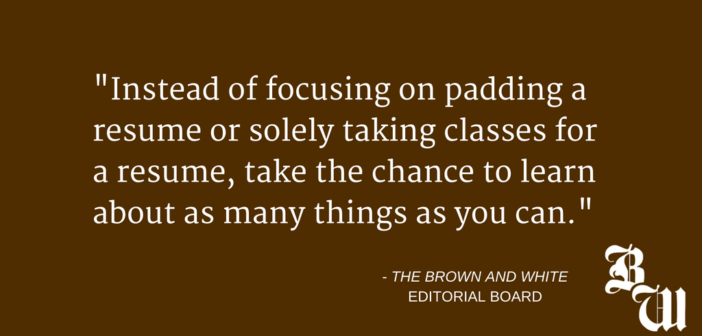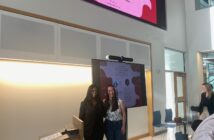Someone can take away your car. Someone can take away your home. Worldly possessions can be lost or stolen, but nobody can take away your education.
That education, which is expensive to obtain, is much more than just a diploma on a crisp, white sheet of paper. It is what develops critical thinking skills and molds the minds of innovators and leaders.
In a world of nearly 7 billion people, only 6.7 percent of people have a college degree. In the United States, just more than 30 percent of Americans have a bachelor’s degree.
At an institution dedicated to higher education, it can be easy to forget that upon graduation, we will be in the top 6.7 percent of the world. To top it off, only 4 percent of U.S. undergraduates attend an institution with an acceptance rate lower than 25 percent, such as Lehigh, according to the Department of Education. The gravity of these things is often lost on us as we run from class to Fairchild-Martindale Library to cram for our next exam and complete a paper that’s due the next day.
Lehigh’s mission statement states we must develop “critical thinking and effective communication as their habit; they must have both a broad understanding of human affairs and a domain of true competence; they are expected to live by a set of mature cultural and personal values, accept the virtue of work as a vehicle of service, and have the will to live and work with exceptional self-discipline.”
This stuffy paragraph, although admirable, neglects to describe the beauty of education in a way that emphasizes the importance of the pursuit of knowledge.
With registration around the corner, many students will register for at least one course simply to fill a requirement. Of course these requirements are important for graduation, but their value is sometimes overlooked, especially if the class is satisfying a general education requirement.
This knowledge can come from classes and assignments, but it also comes from the experiences we have during our time on campus. We derive value from every educational experience we have while here, and we should make the most of those experiences.
Higher education is meant to teach students to think critically. The intellectual stimulation provided by classes cannot be replicated merely by reading PowerPoint slides and reading the textbook during the days leading up to the exam.
It is impossible always to register for the classes we want and to take advantage of every opportunity. There is an opportunity cost — to use a term from ECO 001 — with every decision we make. Even with these restrictions, it is possible to maximize the number of opportunities we can seize.
Education in and of itself is valuable, and employers are looking for their employees to have diversity of skills. Instead of focusing on padding a resume or solely taking classes for a resume, take the chance to learn about as many things as you can. It will benefit you in the long run. Niche learning, or only valuing classes that count toward your major or minor, does not necessarily allow for career flexibility.
Taking a diverse range of interesting classes will provide more benefits than can be anticipated when you are typing in the course numbers to register for classes on a frigid November morning at 7 a.m. Be sure to amass as much knowledge as you can while you are here.
Nobody can take what you learn away from you.






Comment policy
Comments posted to The Brown and White website are reviewed by a moderator before being approved. Incendiary speech or harassing language, including comments targeted at individuals, may be deemed unacceptable and not published. Spam and other soliciting will also be declined.
The Brown and White also reserves the right to not publish entirely anonymous comments.